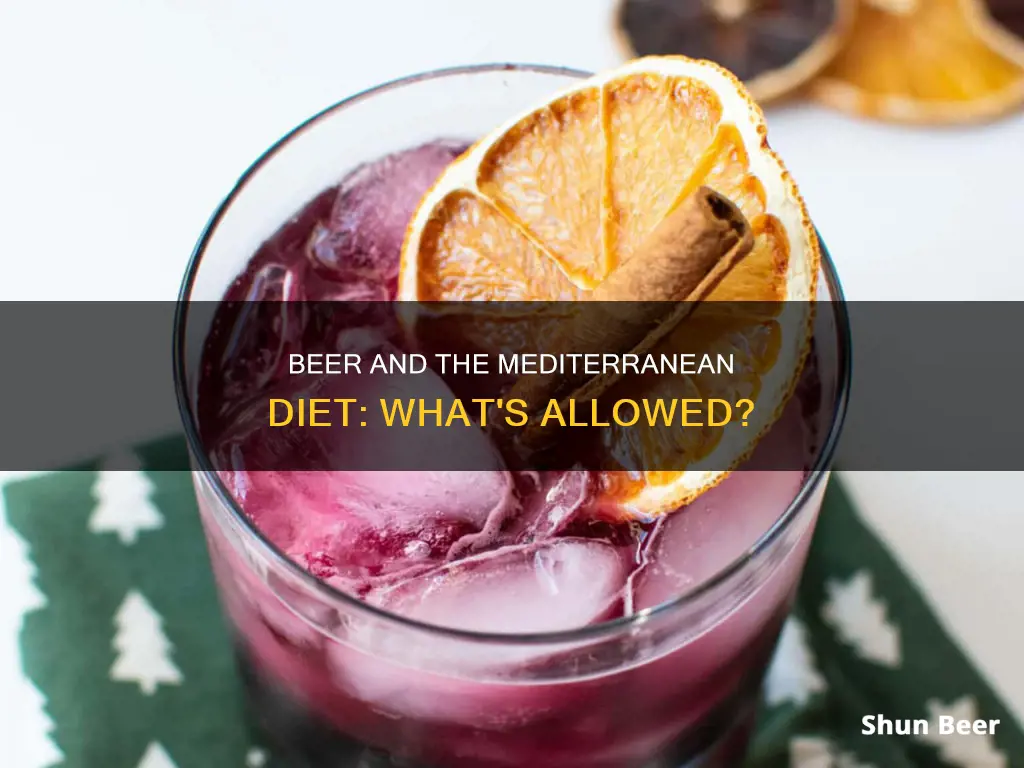
The Mediterranean diet is widely recognised as being highly effective for good health, particularly in reducing the risk of cardiovascular disease. It involves eating lots of vegetables, legumes, nuts, fruits, cereals, and fish, and limiting meat and dairy products. But what about alcohol? Can you drink beer on the Mediterranean diet? The answer is yes, but in moderation. Moderate alcohol consumption, including beer, wine, and liquor, is considered an important component of the Mediterranean diet and has been linked to improved health and longevity. However, it's important to note that excessive alcohol consumption can increase the risk of certain cancers, especially breast cancer in women. Overall, when consumed responsibly, alcohol can be a part of a healthy Mediterranean lifestyle.
What You'll Learn
- Beer is allowed in moderation on the Mediterranean diet
- The diet also includes whole grains, fruits, vegetables, legumes, and nuts
- It is recommended to limit meat and dairy products
- Drinking alcohol with food is typical in Mediterranean countries
- The Mediterranean diet is associated with a reduced risk of cardiovascular disease

Beer is allowed in moderation on the Mediterranean diet
The Mediterranean diet is recognised as being highly effective for good health and reducing the risk of cardiovascular disease. Alcohol, when consumed responsibly, is an important component of the Mediterranean diet and a component of a healthy lifestyle. This is because moderate drinking is good for health and can improve longevity.
However, it is important to note that alcohol consumption, even in moderate amounts, has been linked to increased rates of certain cancers, especially breast cancer in women. Therefore, women with a family history of breast cancer are advised to avoid drinking.
The way alcohol is consumed is also important. In Mediterranean countries, drinking with food is typical, whereas binge drinking without food is more common in countries like the UK. Drinking with food slows the rate of alcohol absorption, limiting dangerous spikes in blood alcohol levels that are linked to high blood pressure and strokes. Even when drinking without a meal, it is customary to have some food, such as a few olives with an ouzo in Greece or tapas with a beer in Spain.
In addition to the protective effects of the Mediterranean diet, the manner in which alcohol is consumed in these countries may also contribute to the reduced risk of certain cancers and other health benefits associated with moderate drinking.
Beer and Doxycycline: Safe Mix?
You may want to see also

The diet also includes whole grains, fruits, vegetables, legumes, and nuts
The Mediterranean diet is based on the traditional eating patterns of countries bordering the Mediterranean Sea, including France, Spain, Greece, and Italy. It is rich in fruits, vegetables, whole grains, legumes, nuts, and healthy fats, and is associated with numerous health benefits.
When following the Mediterranean diet, it is recommended to consume an abundance of plant-based foods, including fruits, vegetables, whole grains, nuts, and legumes. These foods are ideally minimally processed, seasonally fresh, and locally grown. Whole grains such as oats, brown rice, rye, barley, corn, buckwheat, and whole wheat bread and pasta are encouraged.
The diet also emphasizes consuming a variety of fruits. Fresh, frozen, dried, and canned fruits can be included, but it is important to check labels to avoid added sugars and sodium. Examples of recommended fruits are apples, bananas, oranges, strawberries, grapes, dates, figs, melons, and peaches.
Legumes are an important component of the Mediterranean diet, providing plant-based protein and fiber. This includes beans, peas, lentils, pulses, peanuts, and chickpeas. Legumes are versatile and can be added to salads, soups, and pasta dishes or used as a base for dips like hummus.
Nuts and seeds, such as almonds, walnuts, macadamia nuts, hazelnuts, cashews, sunflower seeds, and pumpkin seeds, are a healthy addition to the diet. They can be eaten as snacks or added to meals like cereal, salads, and yogurt. Nut butters, such as almond butter or peanut butter, are also a tasty option.
By including a variety of whole grains, fruits, vegetables, legumes, and nuts in the Mediterranean diet, individuals can benefit from increased fiber, essential vitamins, and minerals. These foods provide a range of health benefits, including improved digestive health, reduced risk of chronic diseases, and better weight management.
In conclusion, the Mediterranean diet's emphasis on whole grains, fruits, vegetables, legumes, and nuts offers a well-rounded and nutritious approach to healthy eating. By incorporating these food groups, individuals can improve their overall health and well-being while enjoying the delicious and diverse flavors of the Mediterranean region.
A Day's Drinking: Beer Binge and Health
You may want to see also

It is recommended to limit meat and dairy products
The Mediterranean diet is based on the traditional foods of countries bordering the Mediterranean Sea, including France, Spain, Greece, and Italy. Research has shown that people living in these regions tend to be healthier and have a lower risk of many chronic conditions compared to those who follow a standard American diet.
The Mediterranean diet emphasizes plant-based foods and healthy fats. It involves eating lots of vegetables, fruits, beans, lentils, nuts, and whole grains. It also includes a moderate amount of natural cheese and yogurt, and little to no red meat. Instead of red meat, the diet recommends choosing poultry, fish, or beans as protein sources.
The diet suggests limiting or avoiding highly processed foods, fatty or processed meats, and refined carbohydrates like white bread and white rice. It also recommends reducing the intake of sweets, sugary drinks, and butter.
By focusing on overall eating patterns rather than strict formulas, the Mediterranean diet offers a flexible and adaptable approach to healthy eating. It is recommended by healthcare providers to reduce the risk of heart disease and support other aspects of health, such as maintaining a healthy weight, stabilizing blood sugar levels, and promoting brain health.
In terms of alcohol consumption, the Mediterranean diet suggests drinking a moderate amount of wine with meals. However, it is important to note that if you don't already drink, it is not recommended to start. The key is to consume alcohol in moderation and always accompany it with food, as this reduces the harmful effects of alcohol.
Beer and Guns: Can You Drink and Carry?
You may want to see also

Drinking alcohol with food is typical in Mediterranean countries
Drinking alcohol is an integral part of the Mediterranean diet and lifestyle. The Mediterranean diet is highly effective for good health and is associated with a reduced risk of cardiovascular disease. It involves limiting meat and dairy products and consuming plenty of vegetables, legumes, nuts, fruits, cereals, fish, and healthy fats. Alcohol is a major component of this diet, and drinking in moderation is key.
The Mediterranean approach to drinking alcohol is characterised by moderate intake spread out over the week, with a preference for red wine consumed alongside meals. Spirits and binge drinking are avoided. This drinking pattern has been linked to significantly reduced mortality. In Mediterranean countries, drinking without a meal is usually accompanied by a small snack, such as olives with ouzo in Greece or tapas with beer in Spain.
The protective effects of the Mediterranean diet against the harmful impacts of alcohol cannot be overlooked. Studies suggest that even low amounts of alcohol can increase the risk of certain cancers, particularly breast cancer in women. However, a trial as part of the Predimed Study found that women following the Mediterranean diet had a reduced risk of breast cancer, despite almost half drinking up to two units of alcohol per day. Extra virgin olive oil, a key component of the Mediterranean diet, contains anti-oestrogens that counteract the carcinogenic effects of increased oestrogen levels caused by alcohol consumption.
Furthermore, folates found in leafy greens and pulses, which are abundant in the Mediterranean diet, also provide protection against the adverse effects of alcohol. While women with a family history of breast cancer are advised to refrain from drinking, the Mediterranean diet and drinking pattern seem to offer some mitigation against the risks associated with alcohol consumption.
In summary, drinking alcohol with food is a typical and integral part of the Mediterranean lifestyle. The Mediterranean approach to drinking, characterised by moderation and accompaniment with meals, has been linked to improved health outcomes and reduced mortality. The protective substances in the Mediterranean diet, such as olive oil and folates, also play a crucial role in counteracting the harmful effects of alcohol.
Beer Drinking: Should You or Shouldn't You?
You may want to see also

The Mediterranean diet is associated with a reduced risk of cardiovascular disease
The Mediterranean diet has been shown to reduce the risk of cardiovascular disease in both observational and randomised controlled trial data. It is comparable to other interventions such as aspirin, statins, physical activity, and even antihypertensives such as ACE-inhibitors or beta-blockers in terms of reducing the risk of cardiovascular disease morbidity, mortality, and events.
The Mediterranean diet is thought to provide cardiovascular benefits due to the synergy among its various cardio-protective nutrients and foods. These include reduced surrogates of cardiovascular disease, such as waist-to-hip ratio, lipids, and markers of inflammation, as well as primary cardiovascular disease outcomes such as death and events.
The Mediterranean diet is the leading diet for risk reduction of cardiovascular disease, with many studies confirming the cardio-protective effects of moderate drinking, especially as part of a Mediterranean diet, and increasing evidence linking the Mediterranean diet with a decreased risk of dementia.
Beer Drinking: Daily Habit to Alcoholism?
You may want to see also
Frequently asked questions
Yes, you can drink beer on the Mediterranean diet, as long as it is in moderation. The Mediterranean diet encourages drinking alcohol in moderation, which typically means up to two drinks per day for men and one per day for women.
Alcohol, when consumed responsibly, is believed to be an important component of the Mediterranean diet and a contributor to a healthy lifestyle. Moderate alcohol consumption has been linked to improved health and longevity, particularly in reducing the risk of cardiovascular disease.
In addition to beer, wine, and liquor, the Mediterranean diet includes a variety of beverages. Water should be the primary drink, but you can also enjoy drinks that are not high in sugar, such as coffee, tea, and smoothies with healthy ingredients.







